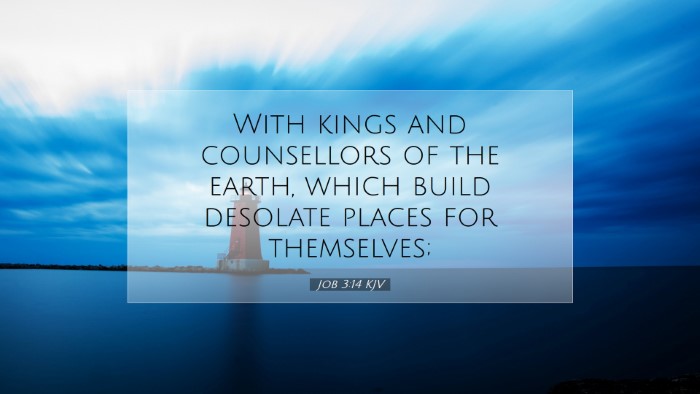Old Testament
Genesis Exodus Leviticus Numbers Deuteronomy Joshua Judges Ruth 1 Samuel 2 Samuel 1 Kings 2 Kings 1 Chronicles 2 Chronicles Ezra Nehemiah Esther Job Psalms Proverbs Ecclesiastes Song of Solomon Isaiah Jeremiah Lamentations Ezekiel Daniel Hosea Joel Amos Obadiah Jonah Micah Nahum Habakkuk Zephaniah Haggai Zechariah MalachiJob 3:14
Job 3:14 KJV
With kings and counsellors of the earth, which build desolate places for themselves;
Job 3:14 Bible Commentary
Commentary on Job 3:14
The Book of Job stands as one of the most profound and challenging texts in the Bible, addressing the themes of suffering, divine justice, and the human condition. Job 3:14 reads: "With kings and counselors of the earth, who built up waste places for themselves." This verse is part of Job's lament, where he expresses deep anguish over the day of his birth, contemplating death as a release from suffering.
Contextual Analysis
In this chapter, Job is grappling with his unbearable suffering. His lament begins with a curse on the day of his birth, lamenting that he was born at all. The reference to kings and counselors highlights the contrast between Job's ruined state and the grandeur often associated with human achievement and power.
Insights from Matthew Henry
According to Matthew Henry, Job's feelings of despair are palpable in this verse. He remarks on the futility of life when evoking the status of kings and counselors, suggesting that even those who build and achieve amid chaos cannot escape the ultimate reality of human suffering and mortality.
Henry draws attention to the 'waste places' that kings build, which can symbolize the transient nature of earthly achievements. They construct grand edifices, yet these efforts may not stand against the profound realities of grief and loss that Job faces. Hence, Henry emphasizes:
- The transient nature of worldly success.
- The futility of human wisdom in the face of suffering.
- The depth of despair when one realizes the highs of life do not shield them from its lows.
Insights from Albert Barnes
Albert Barnes provides a theological reflection on Job's assertion. He notes that Job's inclusion of kings and counselors suggests that those in positions of power also face despair, albeit in different contexts. Barnes posits that:
- Job is expressing a universal truth about suffering, as no one, regardless of status, is exempt.
- The reference to rulers who build implies their efforts may lead to ruin, reflecting Job's own condition.
- It illustrates the sobering reality of existence: high office does not guarantee happiness or immunity from sorrow.
Insights from Adam Clarke
Adam Clarke emphasizes the figurative meaning behind Job’s words. He interprets the 'kings and counselors' as representations of the human condition where even the mightiest are subject to the same existential questions. Clarke notes:
- Job's desire for companionship in his suffering indicates a universal need for shared grief.
- Clarke highlights the irony of powerful figures who create a legacy often lost to time, paralleling Job's enduring despair.
- Ultimately, Job's lament serves as an invitation to reflect on the meaning of life, legacy, and the human contribution to history.
Theological Implications
The exploration of Job 3:14 across these commentaries invites a deeper theological reflection on the nature of suffering. It acknowledges the profound struggle inherent in human existence and raises critical questions:
- What does it mean to suffer in a world where even kings and counselors face despair?
- How do we reconcile the idea of divine justice with the observable reality of suffering in the world?
- What hope can be found in the darkest moments of life, as articulated through Job's lament?
Conclusion
In conclusion, Job 3:14 unveils the depths of human suffering while simultaneously underscoring a universal reality: the pursuit of meaning amidst despair. The insights from Matthew Henry, Albert Barnes, and Adam Clarke converge to remind pastors, students, and theologians that the narrative of Job is not merely an ancient story but a timeless dialogue about the human condition.
Finding solace and understanding within this text encourages a profound exploration of both faith and the inherent struggles of life. As we engage with these reflections, we are invited to accompany Job on this journey through despair towards a greater understanding of hope, grace, and the inexplicable nature of God's interaction with humanity.


